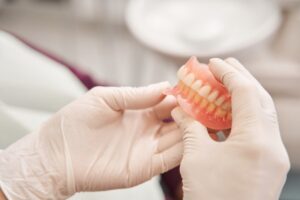
For millions of people, dentures offer a practical solution for tooth loss, restoring appearance and basic oral function. But while dentures can improve quality of life in many ways, they also come with challenges, especially when it comes to nutrition. The question is: Do dentures affect what and how well you eat? The short answer is yes, they can.
Chewing and Food Choices
One of the most immediate changes denture wearers notice is how chewing feels. Even well-fitted dentures don’t provide the same chewing power as natural teeth. Hard, crunchy, or sticky foods – like raw vegetables, nuts, or steak – can become more difficult to manage. As a result, many people adjust their diets, often leaning toward softer, easier-to-chew foods.
Unfortunately, these changes sometimes mean cutting out healthy options. Raw fruits and vegetables, whole grains, and lean proteins can be harder to chew, so those with dentures may unintentionally reduce their intake of essential nutrients. Over time, this can lead to deficiencies in fiber, vitamins (especially A, C, and B12), and minerals like iron and calcium.
Nutritional Impact Over Time
Malnutrition in denture wearers isn’t just a theoretical risk – it’s a documented concern, particularly among older adults. Studies have shown that people with dentures may consume fewer calories, less protein, and fewer fruits and vegetables than those with natural teeth. Poorly fitting dentures can exacerbate this problem, causing discomfort or pain while eating and further discouraging nutritious food choices.
Some denture wearers also report altered taste or reduced appetite, which can contribute to less food intake overall. And if dentures shift or cause sores, it can lead to food avoidance altogether.
Adapting for Better Nutrition
Denture wearers can maintain a healthy, balanced diet – it just takes a bit of planning and adaptation. Soft doesn’t have to mean unhealthy. Steamed vegetables, soft fruits like bananas or ripe pears, ground meats, cooked legumes, and dairy products like yogurt and cheese are all denture-friendly and nutrient-rich.
Blending, chopping, and slow-cooking can also make a big difference. Smoothies, soups, and casseroles can pack in a variety of healthy ingredients while being gentle on the mouth. Using herbs and spices can help enhance flavor if taste perception has changed.
Fit and Function Matter
One of the most important steps to protecting your nutrition while wearing dentures is ensuring a proper fit. Ill-fitting dentures not only make chewing difficult, but they can also cause pain and discourage eating altogether. Regular checkups with a dentist are essential to adjust dentures as needed and to monitor any oral health changes.
Yes, dentures can affect nutrition, but they don’t have to lead to poor dietary habits. With the right support, smart food choices, and regular dental care, denture wearers can continue to enjoy a varied and nourishing diet. Like many aspects of health, it’s all about awareness, adaptation, and taking proactive steps to maintain well-being from the inside out.
About the Author
Dr. Alison Garrad graduated from the top 5 percent of her class at the Texas A&M College of Dentistry and has continued her education through her membership in the prestigious Spear Education club. For all your denture needs, choose Dr. Garrad and our team here at Stone Street Dental where we customize appliances for a natural appearance. To schedule your appointment, visit our website or call our Greenville office at (903) 455-6075.

